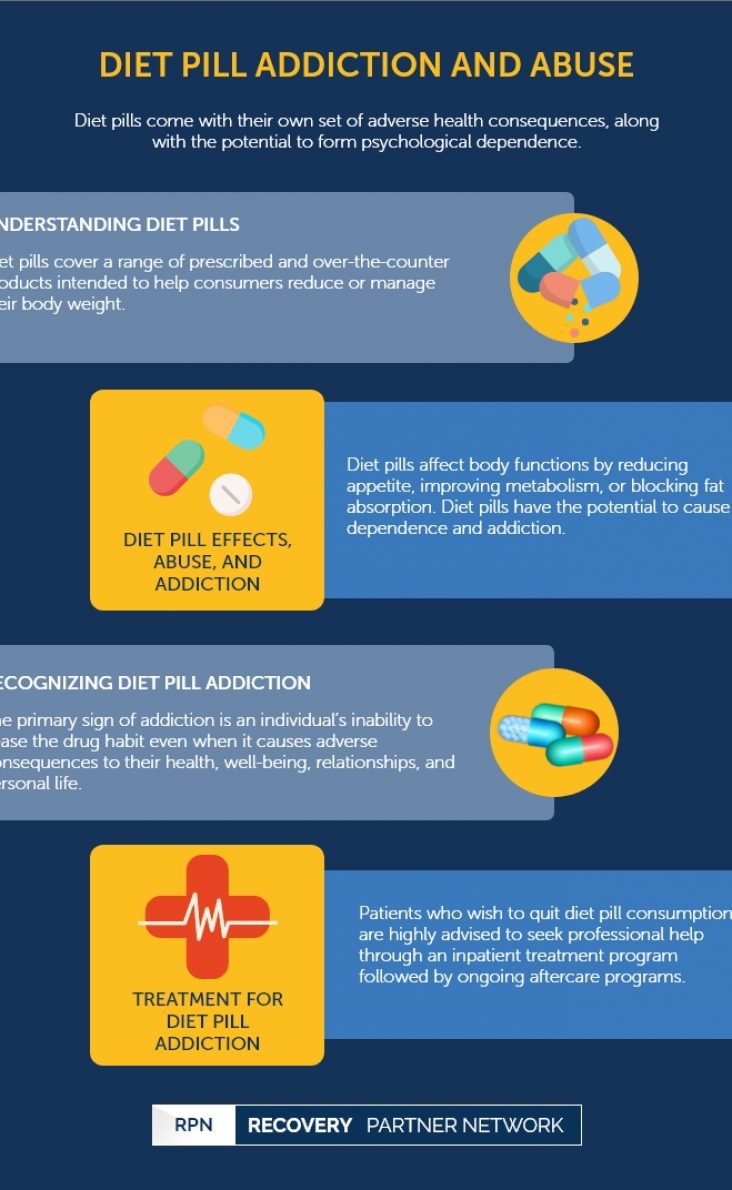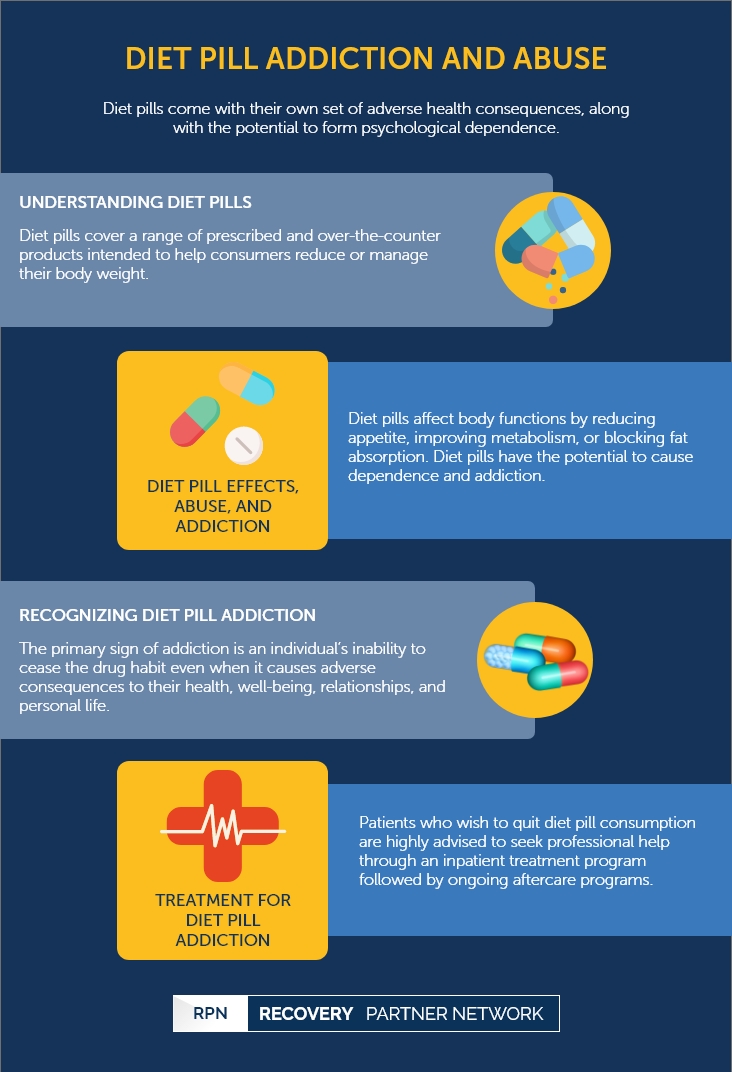Diet pills come with their own set of adverse health consequences, along with the potential to form psychological dependence.
Diet Pill Addiction and Abuse
Diet pill addiction | Table of Contents
Understanding Diet Pills
Diet pills cover a range of prescribed and over-the-counter products intended to help consumers reduce or manage their body weight. Other names of diet pills may include anorectic or anorexiant drugs, centrally acting anti-obesity preparations, appetite suppressants, or anti-obesity medications.
Many prescribed diet pills are classified as a Schedule III or IV substance under the Controlled Substance Act. However, despite these laws, diet pills are being exploited at an unprecedented rate. Due to the prevalent use of diet pills in the US and around the world, there are many forms of such drugs widely available in the market today. Regardless of it being over-the-counter pills or prescription pills, these drugs contain its own set of risks and concerns associated with its use.
FAQ
Prolonged and persistent use of diet pills can lead to an addiction. Those who suffer from co-occurring disorders such as depression or an eating disorder may also form a psychological dependence on the medication.
Diet pills are currently banned by the FDA as it is associated with adverse side effects.
The FDA does not approve of herbal diet pills as they contain harmful side effects.
Diet Pill Effects, Abuse, and Addiction
Diet pills affect body functions that influence weight by reducing appetite, improving metabolism, or blocking fat absorption. Since diet pills are generally used as a substitute for amphetamines to suppress appetite, the two drugs share many similarities, including their potential to cause dependence and addiction.
Although all diet pills come with their own health risks, the consumption of diet pills beyond its prescribed method or dose can lead to adverse effects, including overdose.
Typical side effects of diet pill misuse may include:
- Dizziness
- Chest pain
- Insomnia
- Rash and itching
- Vomiting
- Yellowing of skin or eyes
- Hallucinations
- Dark urine or light-colored stool
- Swelling of legs and ankles
Diet pills may induce enhanced energy and feelings of pleasure, which subsequently increases the risk of abuse and addiction. Addiction to diet pills is most often triggered by eating disorders or other inherent psychological disorders. Forming a dependency on diet pills is not rare, as they provide a misleading sense of control in a life that seems out of balance. Since diet pills are easily accessible over the counter or by prescription, addictions can grow rapidly and unnoticed.
Other aspects that affect the development of diet pill addiction include:
- Home and family
- Biological factors
- Environmental factors
- Early use
- Peer pressure
- How drugs are used
The Most Widely Abused Diet Pills
Is an anorectic that is similar to amphetamines. Benzphetamine is most widely marketed under the brand name Didrex, and its primary role is to suppress appetite in patients with obesity.
Also known as Adipex and Ionamin, it helps reduce appetite. This medication is also meant for short term use in the treatment of obesity.
Also known as Tenuate and Tepanil, is only recommended as a short-term solution to reduce appetite.
Also known as Mazanor and Sanorex, it is currently only authorized for use in the treatment of Duchenne muscular dystrophy. Mazindol prescriptions may be exploited for their appetite inhibiting effects.
Diet Pill Abuse Statistics
- 20 Percent: According to research by the University of Minnesota, 20% of girls between the ages of 19 and 20 had used diet pills,
- 62.7 Percent: About 62.7% of female adolescents use unhealthy methods of weight control as per a study from the University of Minnesota.
- 24 Million: Nearly 24 million people in America suffer from eating disorders.
Recognizing Diet Pill Addiction
There are 11 indicators, according to the Diagnostic and Statistical Manual of Mental Disorders, to help physicians diagnose the severity of a patient’s addiction.
The primary sign of addiction is an individual’s inability to cease the drug habit even when it causes adverse consequences to their health, well-being, relationships, and personal life. This is caused by the formation of a psychological dependence on the drug abused.
Criteria for Substance Use Disorders are:
- Hazardous use: Consuming the drug in situations and ways that are harmful to yourself and others around you, i.e., overdose, driven under the influence, or blacked out.
- Interpersonal and social problems related to use: Strained relationships among friends and family due to substance abuse.
- Neglecting other aspects of your life: No longer having time for any other aspects of life due to spending all available time on using the substance or recovering from its effects.
- Physical or psychological problems related to use: The drug use has contributed to physical health issues like liver or lung cancer or psychiatric disorders, such as depression or anxiety.
- Tolerance: Prolonged use of any drug can cause the development of tolerance.
- Neglecting responsibilities and obligations: Failing to uphold responsibilities and obligations at home, school, and at work.
- Withdrawal: Experiencing withdrawal effects when you cease consumption.
- Repeated attempts to control the use or quit: Repeatedly failing at quitting drug use or reducing its use.
- Losing interest in other activities: No longer partaking in activities that were once of interest to you.
- Craving: Experiencing strong cravings for the drug effects.
Other Safety Concerns
The limited research and studies available have greatly contributed to the confusion among consumers regarding the safety of diet pills. The misconception that it is safe for use due to its natural components has greatly influenced many individuals to consume the drug. Although rare, some dietary supplements have been associated with serious issues, such as liver damage.
Natural stimulants such as ephedra, or ma-huang, were once widely used in the production of weight-loss products. However, the FDA now prohibits its use due to potentially harmful consequences, including:
- Mood swings
- Elevated blood pressure
- Irregular heart rate
- Stroke
- Heart attacks
- Seizures
Bitter orange is a commercially available herbal stimulant found in certain weight-loss pills. This substance is used as a replacement for ephedra due to its similarity in chemical structure and identical characteristics. However, this substance also contains similar adverse reactions to that of ephedra.
Treatment for Diet Pill Addiction
Overcoming a diet pill addiction begins by recognizing the root cause for abusing the drug. Patients who wish to quit their consumption are highly advised to seek professional help through an inpatient treatment program followed by ongoing aftercare programs. The primary aim of inpatient treatment is to help patients identify and address the underlying cause of psychological dependence. The programs will also educate patients on healthy coping skills and practices to help manage temptations and triggers that may arise in the future.
FAQ
- What are the physical symptoms of diet pill withdrawal?
- What are the psychological symptoms of diet pill withdrawal?
- What is the detox process for diet pill addiction and dependence?
Some of the physical symptoms of diet pill withdrawal may include lowered energy levels, muscle aches and pains, problems focusing, fatigue, weight gain, and increased appetite.
Some of the psychological symptoms of withdrawal may include irritability, low mood, cravings, depression, anxiety, and anhedonia.
When individuals enter a detox program, doctors prescribe a replacement drug for the patient or gradually decrease the dose of diet pills.
Recovery Partner Network
We aim to educate and empower. If you feel our library of resources does not cover your specific need, reach out to us, and we would be happy to help.
STATISTICS
© Copyright 2025


